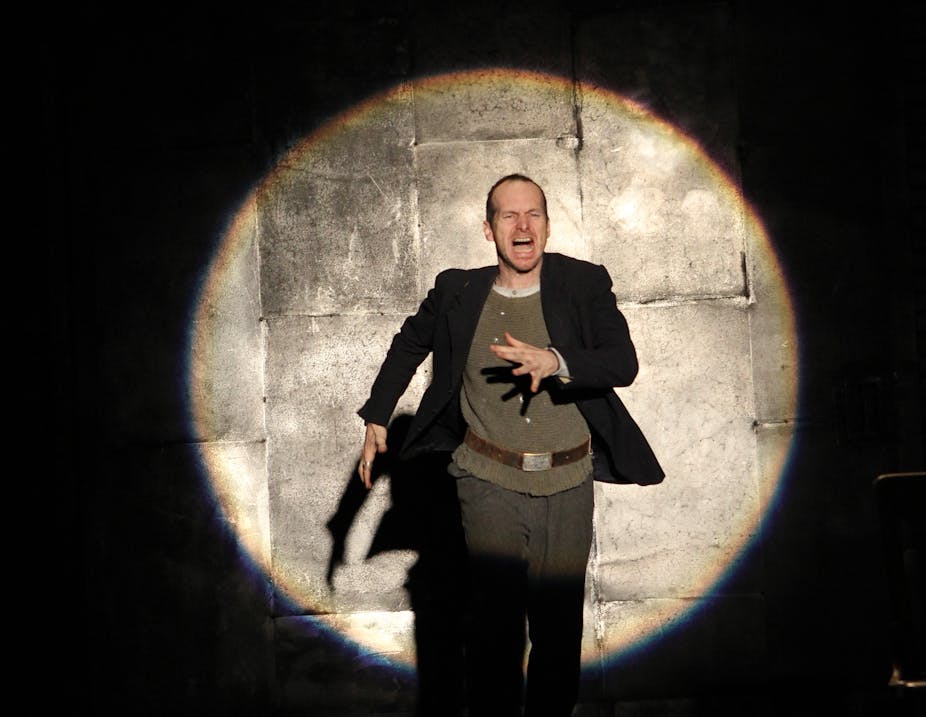At the heart of the Homer’s Coat production of An Iliad, currently playing at the Adelaide Festival, is that most of Homeric of things, a list.
In a narrative compression as consummate as any in the epic poem itself, co-author and actor Denis O’Hare interpolates a catalogue of all the world’s major conflicts since the sons of Atreus, revenging the abduction of a tribal leader’s adulterous wife, laid waste the city of Troy.
How, as a race, we have consumed ourselves in war!
How pride, anger and violence have channelled our skills and strength into baseless, bloody battle!
The ancient Greeks created a pantheon of fickle gods to explain the destructiveness of men’s actions. Just as well, for without them we’d be stuck for an answer.
Then the shrouds of death enfolded him, and his soul went down, down into the deep.
In the end, the Iliad is a prophetic series of atrocities.
We in the Common Era have carried on where those before the birth of Christ left off: butchering each other in a spirit of reasoned madness. Such are the thoughts that whistle through your brain when up close not just to a classic but The Classic.
Up close to An Iliad
The majesty of Homer’s story was intended to be told pretty much as Homer’s Coat do it here: a single actor, a bit of music, a largely empty stage; harangues and asides; comic moments; rhetorical peaks and troughs.
There’s no problem adapting the Iliad for the theatre. The text lends itself to oral communication as a linked cycle of “songs”. Let scholars worry about the exact colour of wine dark seas and rosy-fingered dawns. What matters is delivery not denotation, the power of the story as it advances with the ruthless competence of a Mycenaean phalanx.

A good night out then?
By and large, yes, though this intelligent, true-hearted work is not without its longeurs and irritations.
The nature of contemporary theatrical adaptation demands a framing conceit. So we get a whimsical, Estragon-like narrator figure who procrastinates and sly grogs his way into the evening sideways. It’s the sort of thing that goes down well in the US, I suspect, where a knowing approach to the ancients is proof of education. Being more Antipodean I couldn’t help thinking “why doesn’t he just get on with it?”
But then he does. And once the story is on the march everything falls into place.
Adapters of foundational texts face two choices: to familiarise, transposing their material into a contemporary register, or to estrange and take the audience back to a sharply different time and place. This Iliad, which is right to call itself an Iliad, opts largely for the former.
Galloping through Troy
It is not a straight translation of Homer, or even an edited version, but a perambulatory gallop that includes some direct quotation, a bit of Greek, contemporary caricature (I especially liked the gay Hermes), whimsical travelogue (good description of Troy and its fountains) and a shuttling between then and now to show the constants in the story’s dramatic equation: anger, hatred and war.
O’Hare and his co-author and director Lisa Peterson could have picked any number of juicy passages to present. It is greatly to their credit they chose the one they have.
This version takes in the withdrawal of Achilles from the field of battle in a fit of pique; the death of his young friend, Patroclus, at the hands of the unsmiling Hector (“a breaker of horses”); and Hector’s death at the hands of Achilles, a killing he knew was coming from a man predestined to die on the same arid strip of coast. Priam, Hector’s father, slips away from Troy to the Greek camp to beg for his son’s body. Achilles’ rage knows no bounds until, in a miracle of soul, he overcomes it and hands Hector’s corpse over for honourable burial.
Part of the conceit of the storyteller’s character is that he cannot face the story he is telling, that the price of his song is too much to bear (I can’t go on/I must go on etc).

Another bit of off-Broadway kitsch? Not if you take Homer seriously. In this production, there is no recounting of the destruction of Troy, the murder of its male population, the enslavement of its women. It is all too much to bear and, to be frank, you only have to pick up a newspaper and watch Putin parade around like a latter-day Agamemnon to read about it all over again.
Instead, the production tracks back to dwell on a moment of transcendent forgiveness, of true humanity: Priam grasping Achilles’ hands, as they both weep into the night; the broken king for his son who is forever dead, the doomed warrior for the father he will never see again.
An Iliad by Denis O’Hare and Lisa Peterson is playing at the Dunstan Playhouse as part of the Adelaide Festival until March 8. Details here.
Are you an academic or researcher? Would you like to review something for The Conversation? Contact the Arts + Culture editor.

